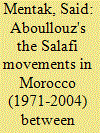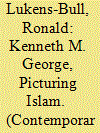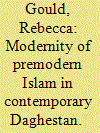| Srl | Item |
| 1 |
ID:
105308


|
|
|
|
|
| Publication |
2011.
|
| Summary/Abstract |
This is a review of a recently published book on Salafiyya in Morocco. The author of the book, Abdelhakim Aboullouz, has conducted a socio-anthropological research on two Salafi movements in Marrakech. With my background knowledge of the topic, I have tried to read Aboullouz's book with a critical perspective: can Salafiyya be defined by only two movements? How far has Aboullouz been loyal to his socio-anthropological approach?
|
|
|
|
|
|
|
|
|
|
|
|
|
|
|
|
| 2 |
ID:
105309


|
|
|
| 3 |
ID:
105305


|
|
|
|
|
| Publication |
2011.
|
| Summary/Abstract |
This ethnographic essay investigates the relations between past and present forms of Islam in the north Caucasian Republic of Daghestan. Conversations culled from fieldwork in Daghestani urban and rural spaces are used to elucidate the cultural, religious, and linguistic diversity of life in this region. Ethnographies in a bookstore, a shrine to the Imam Shamil, and a scholarly archive in Makhachkala unfold against the historical background of Daghestan's long-standing encounter with the Arabo-Islamic world. The essay explores how the post-Soviet turn to post-secular Islam represents an alternative to colonialism and a new way of making meaning in the present. It is intended as a contribution to Islamic studies, modernity theory, and post-Soviet Union area studies.
|
|
|
|
|
|
|
|
|
|
|
|
|
|
|
|
| 4 |
ID:
105302


|
|
|
|
|
| Publication |
2011.
|
| Summary/Abstract |
Muslims in the U.S. are comparatively well-educated, economically indistinct from the rest of the population, with a set of attitudes broadly compatible with the political mainstream. One of the few issue areas on which they stand out as distinctly conservative is on homosexuality, where rates of "disapproval" are at the same level as among evangelical Protestants. This view is reflected in the positions taken by most organized Muslim groups in the U.S., and almost certainly by the vast majority of religious leaders. There are indications of Muslims adapting their faith to the western context, and to intergenerational change in attitudes to sexual diversity. However, increasing sensitivity among American Muslims to the distrust or disdain to which their faith is subject, and to the heightened sense of scrutiny that they experience, may well be contributing to a retention of selective moral traditionalism.
|
|
|
|
|
|
|
|
|
|
|
|
|
|
|
|
| 5 |
ID:
105303


|
|
|
|
|
| Publication |
2011.
|
| Summary/Abstract |
This article addresses the novel phenomenon of the attachment of women from privileged backgrounds to the Tablighi Jama-'at movement in Indonesia. How to understand the involvement of these urban wealthy women who eventually give up their high-class lifestyles for the sake of their new understanding of Islam? The common stereotype of Tablighi Jama-'at women is that they are oppressed, cannot exercise agency, and do not contribute to the development of the movement. However, based on an ethnographic study of middle and upper-class Tablighi Jama-'at women, I found that their passion to return to the true path of Islam and the commitments it embodies have made them aware of their capacity to exercise agency within the movement's structuring conditions. The women's privileged social background has enabled them to embrace the meaning of being active in a religious group. The most notable contribution of these women is their effort in undertaking recruitment and sustaining this religious network of shared meaning with their colleagues. Within these activities they are social agents, not just tools of the movement's men.
|
|
|
|
|
|
|
|
|
|
|
|
|
|
|
|
| 6 |
ID:
105307


|
|
|